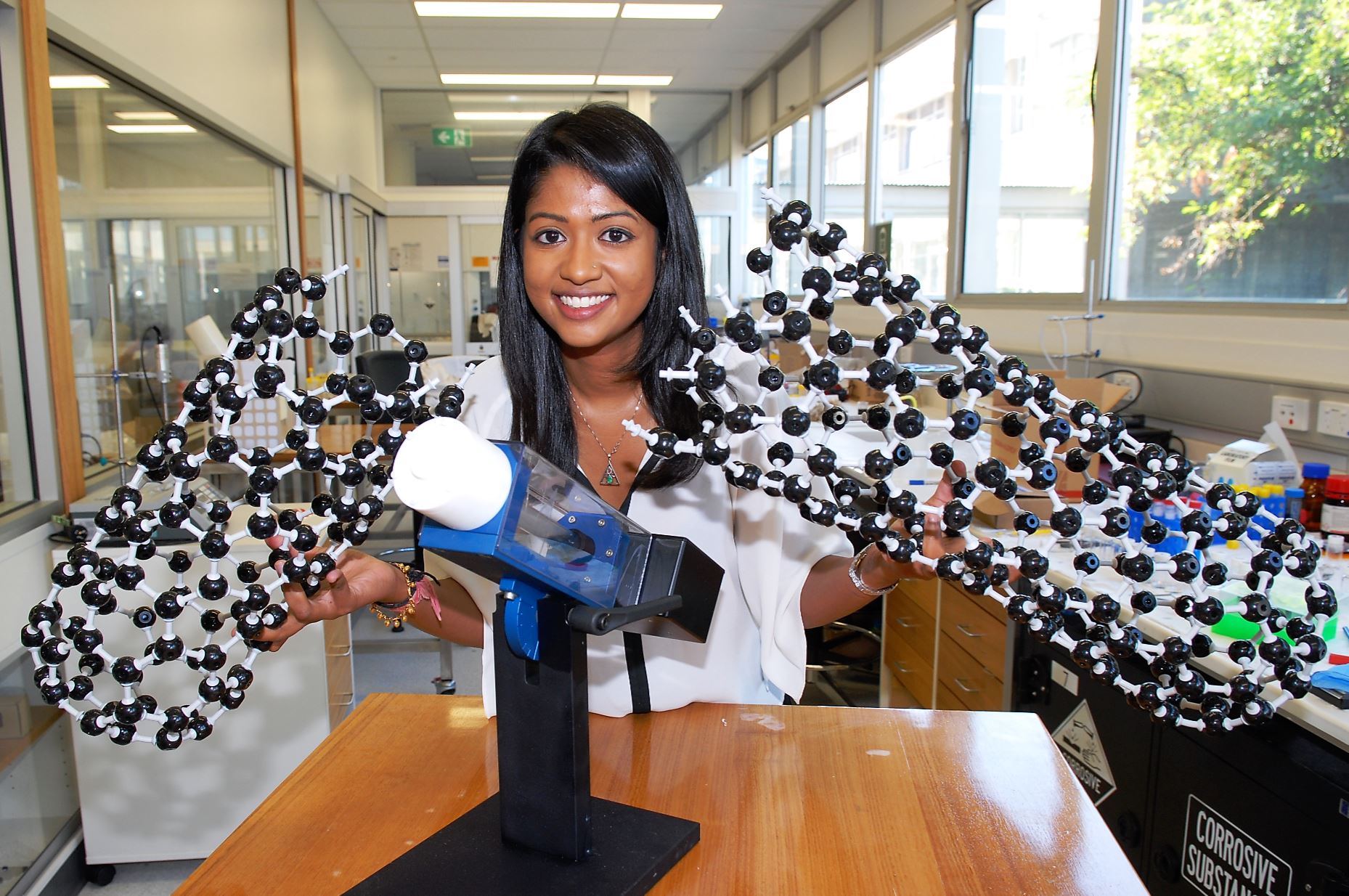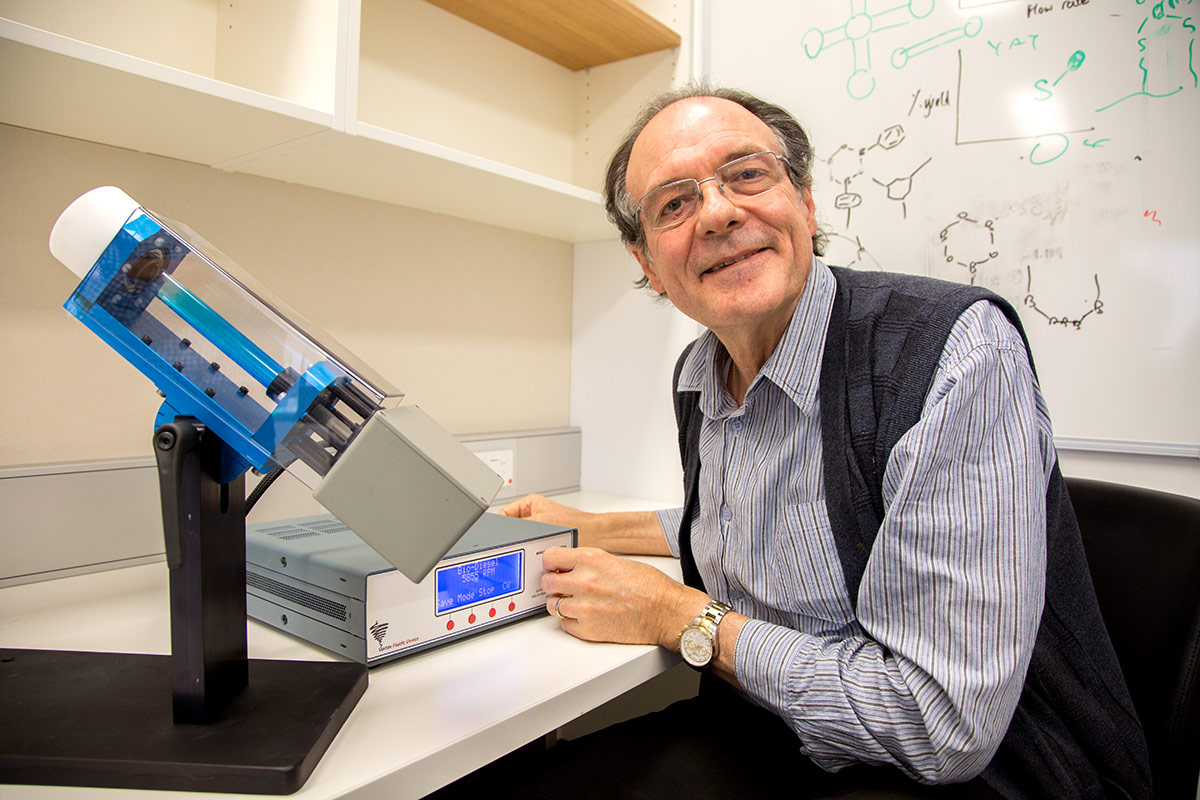
New applications for one of the world’s hardest materials will be commercialised by a newly formed nano-science spinout company.
In an Australian first, the new company 2D Fluidics Pty Ltd – backed by ASX-listed First Graphene Ltd in partnership with Flinders University’s Institute for NanoScale Science and Technology– will commercialise the SA-designed Vortex Fluidic Device (VFD) to produce environmentally safe supplies of high-grade graphite at a price and scale viable for use in energy storage devices, coatings, polymers and other modern materials.
The VFD, conceived and co-invented by the Professor Colin Raston from the Flinders Institute for NanoScale Science and Technology, is already being used in developing a range of novel nano materials.
The remarkable device is capable of producing high-quality graphene and specific length carbon nanotubes without using harsh or toxic chemicals, which will be manufactured for commercial sales by the new company 2D Fluidics.
2D Fluidics has been formed through a collaboration between ASX-listed company First Graphene Ltd and Flinders University.

The new company will commercialise the VFD to produce a range of materials such as graphene and sliced carbon nanotubes, with the bonus of not needing to use harsh or toxic chemicals in the manufacturing process (which is currently a requirement for conventional graphene and shortened carbon nanotube production).
This clean processing breakthrough will also greatly reduce the cost and improve the efficiency of manufacturing these new high quality super-strength carbon materials, says First Graphene managing director Craig McGuckin.
“This latest project promises to open an exciting growth path in the world of advanced materials production,” Mr McGuckins says.
First Graphene is investigating new production methods to produce graphene from its Sri Lankan vein graphite.
Nano-carbon materials materials can replace metals in many products, creating new opportunities in manufacturing, says Professor Raston, Flinders College of Science and Engineering Professor of Clean Technology.
The key intellectual property used by 2D Fluidics comprises two patents around the production of carbon nanomaterials, assigned by Flinders University.
“The commercial availability of these materials using the VFD will open exciting possibilities in industry for low-cost, environmentally sustainable production, particularly with 2D Fluidics looking to scale up production using our device’s continuous flow technology,” Professor Raston says.
In the past three years the VFD has been a “game-changer’ for potential applications across the sciences, from engineering to medicine.
The 2D Fluidics venture will investigate carbon materials for commercial application in a range of industries, from novel plastics and composite materials, to electronic components including circuits, supercapacitors and even batteries.
“The commercialisation of the device will have a big impact on the teaching and research arenas,” Professor Raston adds.
2D Fluidics will also manufacture the VFD, which is expected to become an in-demand state-of-the-art research and teaching tool for thousands of universities world-wide, and should be a strong revenue source for the new company.
First Graphene Ltd has been working with Professor Raston and others in his team at Flinders University for more than 12 months.
The Vortex Fluidic Device and a laser have been used to cut the super hard carbon nanotubes at an average length of 170 nanometres using only water and a solvent.
Carbon nanotubes are minute, tubular cylinders of carbon atoms with extraordinary mechanical, electrical, thermal, optical and chemical properties.
They have been described as having 200 times the strength and five times the elasticity of steel, with five times the electrical conductivity, 15 times the thermal conductivity and 1,000 times the current capacity of copper – and with almost none of the environmental or physical degradation issues common to metals.
The creation of 2D Fluidics builds on the reputation of the Flinders Institute for NanoScale Science and Technology. The Institute’s Director Professor David Lewis says the decision to form an institute underlines Flinders’ strong cohort of more than 120 high performing researchers in this field, strong external partnerships and increasing international reputation.

